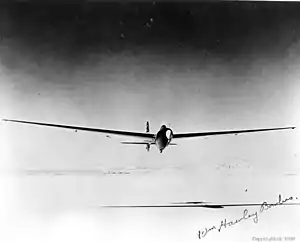| BS-100 Super Albatross | |
|---|---|
 | |
| A Bowlus BS-100 Super Albatross in flight | |
| Role | Glider |
| National origin | United States |
| Designer | Hawley Bowlus |
| First flight | 1938 |
| Number built | 2 |
| Developed from | Bowlus BA-100 Baby Albatross |
The Bowlus BS-100 Super Albatross is a single seat, mid-wing glider that was designed by Hawley Bowlus in 1938.[1][2]
Design and development
The Super Albatross was created from a Baby Albatross fuselage pod and tail boom. The wings used the outer panels of the Senior Albatross. The resulting aircraft was of wooden construction, with the wings and tail surfaces covered in aircraft fabric. The tail boom is a metal tube.[2]
Only two examples were constructed. The first was built by Bowlus and features an all-flying horizontal stabilizer. The second was built by Frank Kelsey and has a fixed horizontal stabilizer and flaps in addition to spoilers.[2]
Aircraft on display
Specifications (Super Albatross)
Data from Soaring[2]
General characteristics
- Crew: one
- Wingspan: 45 ft 0 in (13.72 m)
- Wing area: 125 sq ft (11.6 m2)
- Aspect ratio: 15.7
- Airfoil: Gö 549, with the wingtips having a symmetrical airfoil
- Empty weight: 435 lb (197 kg)
- Gross weight: 645 lb (293 kg)
Performance
- Maximum glide ratio: 29:1 at 47 mph
- Rate of sink: 150 ft/min (0.76 m/s) at 42 mph
- Wing loading: 5.25 lb/sq ft (25.6 kg/m2)
References
Wikimedia Commons has media related to Bowlus BS-100 Super Albatross.
- ↑ Activate Media (2006). "Super Albatross BS-100 Bowlus". Archived from the original on July 15, 2011. Retrieved March 1, 2011.
- 1 2 3 4 Said, Bob: 1983 Sailplane Directory, Soaring Magazine, page 6. Soaring Society of America, November 1983. USPS 499-920
- ↑ National Soaring Museum (2011). "Sailplanes in Our Collection". Archived from the original on May 16, 2011. Retrieved February 26, 2011.
- ↑ US Southwest Soaring Museum (2010). "Sailplanes, Hang Gliders & Motor Gliders". Retrieved May 26, 2011.
This article is issued from Wikipedia. The text is licensed under Creative Commons - Attribution - Sharealike. Additional terms may apply for the media files.